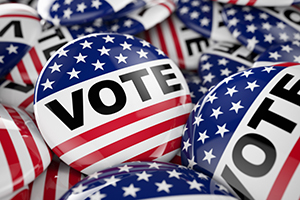 Missouri and Illinois have deemed voting to be such an important civic duty that each state has protected an employee’s right to have sufficient time to vote. Missouri law provides for three contiguous hours, while Illinois law requires two contiguous hours, between the time the polls open and the time they close, for employees to exercise their right to vote in any election.
Missouri and Illinois have deemed voting to be such an important civic duty that each state has protected an employee’s right to have sufficient time to vote. Missouri law provides for three contiguous hours, while Illinois law requires two contiguous hours, between the time the polls open and the time they close, for employees to exercise their right to vote in any election.
Polls are open between the hours of 6:00 a.m. and 7:00 p.m. in each state on Election Days.
Both Missouri and Illinois law requires employers to give time off, if circumstances so warrant, to employees who are eligible to cast a vote, and in fact do vote, on any Election Day.
Missouri employees are entitled up to three hours, while Illinois employees are entitled to up to two hours, of paid voting leave so long as the requirements of the respective state statutes are met. In both states, an employee must request voting leave prior to Election Day, but the employer has the right to specify the hours during which the employee can be absent to exercise his or her right to vote. Note, the employee can notify his or her supervisor the day before an election of their intent to exercise their voting rights, and the employer will have to accommodate the disruption that such absence may cause. However, an employer is not required to provide voting leave if the employee’s shift begins at least three hours in Missouri, and two hours in Illinois, after the polls open (6:00 a.m.) or an at least three hours (Missouri) or two hours (Illinois) before the polls close at 7:00 p.m. or if the employee otherwise has the requisite block of time when not required to report for work while the polls are open.
Thus, for an employee to be entitled to time off to vote, the employee would otherwise be required to report for work in Missouri before 9:00 a.m. and before 8:00 a.m. in Illinois and would still be required to be at work on Election Day after 4:00 p.m. in Missouri, and 5:00 p.m. in Illinois. In both Missouri and Illinois, the employer has the right to designate the time period when voting leave is to be taken. The minimum period of time for voting provided by the employer may include time before or after reporting for work, so long as the polls are then open. Moreover, the employee would have to be eligible to vote, which may be evidenced by a voter registration card or reference to an online database of eligible voters.
If an employee does not request time off prior to Election Day to exercise their right to vote, an employer need not provide such voting leave. However, if the employee requests voting leave in a timely manner, the employer may require that such employee provide proof of having actually voted. If the right to take voting leave is properly exercised, the employer may neither discharge nor discipline, or threaten to discharge or discipline, such employee.
The employee is entitled to receive his or her usual and customary compensation for such voting leave if required to be absent during the normally scheduled workday. In Missouri, the Missouri Attorney General has previously held that such compensation is to include overtime or other pay differential if such was the normal work week schedule for the affected employee.
In Illinois, employers with 25 or more employees are also obligated to accommodate employees who engage in election related activities, including serving as an election judge. An employee serving as an election judge is entitled to be absent from work to permit serving in that capacity, subject to limitations, including:
- the employee must give their employer at least 20 days written notice of the absence and the purpose of such absence; and
- while an employer cannot penalize an employee for being absent to serve as an election judge, such employees are not entitled to pay during such absence.
Understanding not only the applicable law, but also how the courts interpret and construe laws to the particular facts of an employment matter is not always an easy task. In fact, the law and its interpretation and construction evolve as more complex scenarios develop.
Guiding businesses, both for-profit and nonprofit organizations, through the intricacies of both case law and statutes affecting all aspects of business demands more than just a passing familiarity. The attorneys at Jenkins & Kling, P.C. have substantial experience representing businesses and nonprofit associations in those facets that most impact business enterprises. Please let us know how we can help you understand your rights and responsibilities. Please contact David Weiss at [email protected] or at 314.561.5078 if we may be of assistance.
